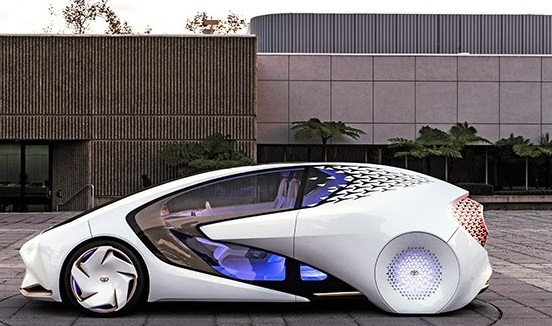
The Future of Driving is (Not) in Your Hands
A future of driverless cars and increased mobility for all is no longer the stuff of science fiction — and Toyota is busy making sure it will become reality sooner rather than later.
As a leader in this space, Toyota is converting itself from an automobile company into a mobility company, seeking to create new ways to move and connect customers, whether it’s across the country, across town, or just across the room. Such a radical transformation is an integral part of the DNA of a company that originally built weaving looms, not cars. It was Kiichiro Toyoda, grandfather of today’s global president Akio, who decided to do what many thought impossible at the time — switch from building looms to building cars.
Technology is changing quickly and the race is on to develop self-driving cars that enable everyone — including seniors, people with a disability and the visually impaired — to enjoy safe mobility and the fun of driving. Billions of dollars are being pumped into development
of artificial intelligence and robotics to support the development of self-driving vehicles.
Almost every industry sector is involved — car makers, transport and related service providers, tech giants, policymakers and consumer advocates. The competitors no longer just make cars. Google, for example, already has a prototype car with no steering wheel, brake pedal or accelerator. Toyota understands the challenge such companies pose because, after all, Toyota itself didn’t start out by making cars either.
Three types of artificial intelligence will be critical to the success of this brave new world: advanced recognition and predictive decision-making functions, vehicle-to-vehicle and vehicle-to-infrastructure communication, and technology for involving passengers, including the transfer of control between driver and vehicle.
Toyota is already testing vehicles that enable automated driving on highways from the entry-ramp all the way through to the exit-ramp. They use on-board technology — cameras, radars, laser sensors and software that merges all this data — to evaluate traffic conditions, make decisions and take actions. This includes merging onto or exiting highways, maintaining or changing lanes, and maintaining appropriate gaps between vehicles. Vehicles with these abilities are expected to be on sale before 2020.
Further development of artificial intelligence learning functions, aimed at achieving a higher level of autonomy, is expected to result in vehicles capable of automated driving on regular roads by the mid-2020s.
There are compelling advantages in support of autonomous vehicles: saving lives and money by reducing driver fatigue, eliminating human error, easing congestion, shortening commuting times, and providing greater access to mobility for everyone.
Another benefit could be lower cost of ownership. New technologies become cheaper through wider use, while cars may no longer require the expense and weight of features such as airbags, bumpers and crumple zones — making them cheaper, lighter, more fuel-efficient and perhaps longer lasting. While self-driving cars may mean fewer jobs for taxi, delivery, bus and truck drivers, they can also create opportunities. For example, driverless vehicles operating 24 hours a day will require more human maintenance.
However, legal issues must be resolved before allowing a driver to take their hands off the steering wheel. This level of automation is not legal anywhere, and it could be problematic in countries such as Australia, where laws are state-based. In addition, the tech community will have to collaborate with insurance providers and consumer advocates to address the challenges these vehicles will create.
Of course, there are many people who are not fans of the self-driving vehicles — they love their car and regard it as more than a means of transport. It provides autonomy, it’s an expression of their personality, and they value the experience of driving. Toyota also has that covered with vehicles like the Concept-i, a vision for a car that uses artificial intelligence to build a relationship with you, the driver. It can capture your state of mind and keep you engaged to reduce the risk factors of accidents. It understands what you like and what you want to do. It’s a vehicle you can love, and that can love you back.
While a society in which vehicles drive themselves sounds like fantasy, it’s no longer science fiction. We are now on the cusp of making the once-futuristic concept of autonomous driving a reality.
